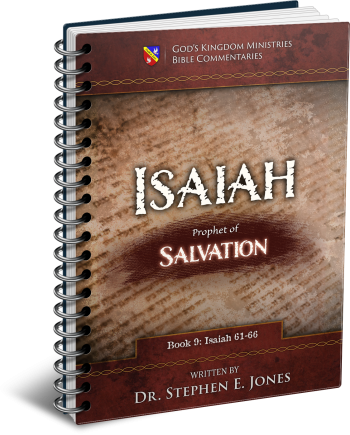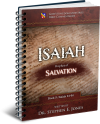Latest Posts
View the latest posts in an easy-to-read list format, with filtering options.

Isaiah is the prophet of Salvation. He is also known as the truly "Universalist" prophet, by which is meant that He makes it clear that salvation is extended equally to all nations and not just to Israel. He lived to see the fall of Israel and the deportation of the Israelites to Assyria, and he prophesied of their "return" to God (through repentance). He is truly a "major prophet" whose prophecies greatly influenced the Apostle Paul in the New Testament.
Category - Bible Commentaries

The “rebellious people,” God said, were “not My people,” regardless of their physical descent back to Abraham, Isaac, and Jacob. They did not lose their status as Israelites; most of them had never been Israelites from the beginning. To be a true Israelite, one had to have New Covenant faith in the likeness of Abraham’s faith.
In the same way, Jacob himself was not born an Israelite. It was only after He had an encounter with the angel that he received the revelation necessary to become an Israelite. Nonetheless, God had “chosen” him before his birth, for it was the will of God that he would become an Israelite. He spent his first 98 years as “Jacob,” the deceiver, depending upon his own flesh to fulfill the promises of God. He became an Israelite by recognizing that “God rules,” and thereafter, he was named Israel to reflect the testimony that God truly is sovereign.
Hence, the rebellious people in Isaiah’s day were not Israelites but Jacobites who were destined to become Israelites at some point in the future. Most of them, like the foreigners, died without receiving that promise. Yet the day will come when every knee will bow to God and recognize His sovereignty.
This will occur at the great White Throne judgment, where those who were believers in their lifetime will become Israelites. Those who remained unbelievers in their lifetime will become Jacobites and will begin to “learn righteousness” (Isaiah 26:9) so that they too may become Israelites at the Creation Jubilee.
Isaiah 65:3-5 says of these rebellious people,
3 “A people who continually provoke Me to My face [paniym], offering sacrifices in gardens and burning incense on bricks; 4 who sit among graves and spend the night in secret places; who eat swine’s flesh, and the broth of unclean meat [piggul, “abomination”] is in their pots. 5 Who say, ‘Keep to yourself, do not come near me, for I am holier than you!’”
Provoking God to His “face” (paniym) may be seen as a way of provoking the angel Peniel in the same way that the Israelites did by worshiping the golden calf. God had warned the Israelites in Exodus 23:20-23 (KJV) not to “provoke” the angel who was leading them at the time. Hence, when they later provoked Peniel by worshiping the golden calf, he was replaced by Michael, who would lead them through the Jordan instead of from Kadesh-barnea.
The people in Isaiah’s day had again provoked God by adopting the idolatrous practices of the other nations. They had built “gardens” for worship—probably the equivalent to the Asherah, “groves” (Exodus 34:13, KJV). These were built to represent the Garden of Eden, for by their sacrifices they thought they might appease “the Cherubim and the flaming sword which turned every direction to guard the way to the tree of life” (Gen. 3:24).
However, their worship was unacceptable to God, for they sought to re-enter Eden (“Paradise”) in unlawful ways. They believed that the original sin was sexual in nature, and they taught that men and women were required to purify themselves and reverse the original sin by having sexual relations with the priest or priestess in the groves. Their sacrifices in the groves were likewise unlawful, for they burned incense on man-made “bricks” (lebanaw) that were formed from white clay. The law of God commanded that altars must be made of naturally-shaped stone. Exodus 20:25 says,
25 If you make an altar of stone for Me, you shall not build it of cut stones, for if you wield your tool on it, you will profane it.
Our hearts are God’s true altars, and if any man tries to shape his own heart by the power of the flesh, he only pollutes it, even if the shape looks beautiful in the eyes of men. The Old Covenant attempts to shape the heart by man’s works, but under the New Covenant God writes the law upon our hearts by the power of the Spirit.
False worship also might lead them to sacrifice swine on man-made altars. The Latins sacrificed pigs to Ceres, and they often did so at weddings and when making treaties. Of course, they also ate the sacrifices. In God’s law, the sin offerings were to be eaten by the priests (Lev. 6:26, 29), but no unclean animal was to be sacrificed or eaten.
The food laws in the law show us how to eat clean spiritual food. Those who ate “swine’s flesh” testified that they accepted teachings that did not stand upon a divided hoof, that is, a double witness (Lev. 11:3). Neither did they chew the cud, for they did not meditate on the word to allow the Holy Spirit to transform facts into revelation. Hence, their religious teachings were an abomination (piggul) in the sight of God.
Later, Isaiah mentions this practice of sacrificing and eating swine’s flesh, adding also that they ate mice (Isaiah 66:17), which were also unclean by the standard of Leviticus 11. All unclean animals were designed to represent unclean teachings. The ultimate truth is that we are to “eat” Christ’s flesh and “drink” His blood (John 6:53), for He is the perfect and spotless Lamb and is alone our true Bread and Wine (Matt. 26:27, 28).
The idolatrous people thought that eating their unclean sacrifices in their gardens made them holier than others, for they believed that they had taken the first step toward reversing the effects of Adam’s original sin. Their belief was that Adam fell through seven stages (represented by the seven planets). The first “planet” was the moon, which they believed to be a sexual symbol. To return to the plane of the stars (“sons of God”), they believed that they had to revisit each of the seven stages. That was why they practiced sexual perversion in the groves, for this was thought to be the first step in their ascension.
But the prophet said that their righteousness was as “a filthy garment” (Isaiah 64:6). They could not achieve true holiness by such unclean teachings. The “Highway of Holiness” in Isaiah 35:8 has no unclean people traveling on it. God’s Highway is depicted in the seven feast days: Passover, Wave-sheaf offering, Unleavened Bread, Pentecost, Trumpets, Atonement, and Tabernacles. This path is very different from the path of the seven planets, which is “smoke in My nostrils” (Isaiah 65:5).
Isaiah 65:6, 7 says,
6 “Behold, it is written before Me [paniym, “in My presence”], I will not keep silent, but I will repay [shalam, “pay, make restitution, be in a covenant of peace”]; I will even repay into their own bosom, 7 both their own iniquities and the iniquities of their fathers together,” says the Lord. “Because they have burned incense on the mountains and scorned Me on the hills, therefore I will measure their former work into their bosom.”
This was written before God’s face, that is, in God’s presence, verifying the promise: “I will repay.” This was a reference to Deut. 32:35, “Vengeance is Mine, and retribution,” which the Apostle Paul renders as “Vengeance is Mine, I will repay” (Rom. 12:19). Paul instructs us not to take vengeance into our own hands, while Isaiah focuses upon the fact that God will indeed “take vengeance.”
God’s “vengeance” is not the same as man’s vengeance. That is why men should refrain from taking vengeance. Men take revenge in a destructive way; God takes vengeance with the ultimate purpose of making a covenant of peace—that is, restoring sinners by means of correction. Divine justice seems destructive at the start, but it reconciles His enemies in the end.
In Isaiah 65:7 God declares His intention to deal with “their own iniquities and the iniquities of their fathers.” This is probably a reference to Exodus 34:6, 7, which says,
6 Then the Lord passed by in front of him [Moses] and proclaimed, “The Lord, the Lord God, compassionate and gracious, slow to anger, and abounding in lovingkindness and truth; 7 who keeps lovingkindness for thousands, who forgives iniquity, transgression and sin; yet He will by no means leave the guilty unpunished, visiting the iniquity of fathers on the children and on the grandchildren to the third and fourth generation.”
Though He is “compassionate and gracious,” God will also judge sinners. His judgments are subordinate to His Love-nature, and because He will restore all mankind in the end, His judgments do not contradict or thwart His love.
The law, which defines His righteous nature, says in Deut. 24:16,
16 Fathers shall not be put to death for their sons, nor shall sons be put to death for their fathers; everyone shall be put to death for his own sin.
Ezekiel 18:20 interprets it this way:
20 The person [nephesh, “soul”] who sins will die. The son will not bear the punishment for the father’s iniquity, nor will the father bear the punishment for the son’s iniquity; the righteousness of the righteous will be upon himself, and the wickedness of the wicked will be upon himself.
If the children cannot be liable for the sins of their fathers, how, then, can God be righteous in “visiting the iniquity of the fathers on the children”? The bigger question is how God could make Adam’s children liable for the original sin? God imputed Adam’s sin to all of us, and this is the reason why we were born mortal. We are paying for the sin of our father.
The only way God can do this and remain true to Himself is to save all mankind in the end. His judgments are not perpetual, for the law of Jubilee limits all liability for sin-debt. Christ came as “the last Adam” (1 Cor. 15:45) to reverse all the effects of the first Adam’s sin. Paul compares the two Adams, their works, and the result of their works in Rom. 5:12-21. In particular, we note Rom. 5:18, 19, which says,
18 So then as through one transgression there resulted condemnation to all men, even so through one act of righteousness there resulted justification of life to all men. 19 For as through the one man’s disobedience the many were many sinners, even so through the obedience of the One the many will be made righteous.
Hence, imputing Adam’s sin to his children is a temporary injustice toward all mankind. He makes us liable for the sin of our father, Adam, but then reverses it through the last Adam, Jesus Christ, whose “one act of righteousness” brought “justification of life to all men.” To me, this is the only way that God could justify His actions in accordance with His compassionate and loving nature.
Because of this, God is able to fulfill His New Covenant vow to make all men His people and to be their God—not only those who gathered before Him under Moses, but all who were not present as well (Deut. 29:13-15).